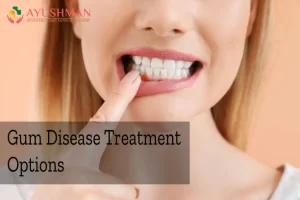Why are My Teeth Sensitive & How to Treat Tooth Sensitivity?

Why are My Teeth Sensitive & How to Treat Tooth Sensitivity?

Teeth sensitivity can happen when you eat or drink things that are hot, cold, sweet, or sour, or even when you breathe in cold air. The pain can be sharp, sudden, and go deep into the nerves of your teeth. Ways to treat it include using fluoride, using special toothpaste for sensitivity, and getting dental bonding.
Why Are My Teeth So Sensitive?
Have you ever experienced pain or discomfort after eating ice cream or hot soup? If you have, you’re not alone. While this kind of pain might be a sign of a cavity, it’s also common for people with sensitive teeth.
Tooth sensitivity, also known as “dentin hypersensitivity,” is exactly what it sounds like – pain or discomfort in the teeth triggered by certain things, like hot or cold temperatures.
It could be a temporary issue or a recurring problem, affecting one tooth, several teeth, or all of them in one person. Various factors can cause it, but most cases of sensitive teeth can be easily managed by making changes to your oral care routine.
Signs of Sensitive Teeth
If you have sensitive teeth, you might feel pain or discomfort in response to specific triggers. This discomfort often occurs at the roots of the affected teeth. The most common triggers include:
- Hot foods and beverages
- Cold foods and beverages
- Cold air
- Sweet foods and beverages
- Acidic foods and beverages
- Cold water, especially during routine dental cleanings
- Brushing or flossing teeth
- Mouth rinses with alcohol
Your symptoms may vary in intensity and may come and go without a clear cause.
What Causes Sudden Tooth Sensitivity?
There are various reasons why you might experience sudden tooth sensitivity. Here are some common factors:
- Brushing too hard: Using a hard-bristled toothbrush or brushing too forcefully can wear down enamel and expose the dentin, leading to sensitivity.
- Gum recession: Thin gum tissue, either genetically or due to periodontal disease, can cause the gums to pull away from the teeth, exposing the roots and causing sensitivity.
- Gum disease: Inflamed and sore gums can result in sensitivity as the loss of supporting ligaments exposes the root surface, connecting directly to the tooth nerve.
- Cracked teeth: Chipped or broken teeth can harbor bacteria, leading to inflammation and sensitivity in the pulp of the tooth.
- Teeth grinding: Grinding or clenching teeth may wear down enamel and uncover the underlying dentin, causing sensitivity.
- Teeth whitening products: Some teeth whitening products contribute to sensitivity. If you’re considering teeth whitening and have sensitivity, consult your dentist for suitable options.
- Age: Tooth sensitivity tends to be higher between the ages of 25 and 30.
- Plaque buildup: Plaque on the root surfaces can contribute to sensitivity.
- Mouthwash use: Certain over-the-counter mouthwashes with acids can worsen sensitivity, especially if dentin is exposed. Ask your dentist about neutral fluoride solutions if you have dentin sensitivity.
- Acidic foods: Regular consumption of highly acidic foods like citrus fruits, tomatoes, pickles, and tea can erode enamel and lead to sensitivity.
- Recent dental procedures: Sensitivity after dental work, such as fillings, cleanings, or restorations, is usually temporary and tends to disappear within four to six weeks.
How to Treat Tooth Sensitivity
If your tooth sensitivity is mild, you can try using over-the-counter dental products.
- Choose the right toothpaste: Look for toothpaste specifically designed for sensitive teeth. These toothpaste options are free from irritating ingredients and may contain desensitizing agents to block discomfort from reaching the tooth nerve.
- Opt for alcohol-free mouthwash: Use alcohol-free mouthwash, as it is less likely to irritate sensitive teeth.
- Use a softer toothbrush: Select a toothbrush labeled as “soft” and brush more gently. Softer brushes are gentler on sensitive teeth.
- Be patient: It may take a few applications for these treatments to show results. Improvement is typically noticeable within a week.
If home remedies don’t provide relief, consult your dentist for further options:
- Prescription toothpaste and mouthwash: Your dentist may recommend specialized products that are more potent than over-the-counter options.
- Fluoride gel or desensitizing agents: In-office treatments, such as the application of fluoride gel or prescription-grade desensitizing agents, can strengthen enamel and provide added protection for your teeth.
Final Note
Tooth sensitivity can stem from various factors like worn enamel, exposed roots, cavities, cracks, or recent dental work. Whether you need treatment depends on the underlying cause. Mild sensitivity can be managed with desensitizing toothpaste and proper oral care. However, if sensitivity is severe due to issues like gum recession, cavities, or cracked teeth, professional treatment may be necessary. Your dentist can identify the cause of your sensitive teeth and suggest appropriate measures to address the issue.









